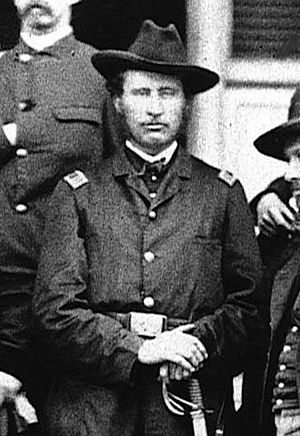George W. Hooker facts for kids
Quick facts for kids
George White Hooker
|
|
|---|---|

Hooker in c. 1865
|
|
| Born | February 6, 1838 Salem, New York, U.S. |
| Died | August 6, 1902 (aged 64) |
| Years of service | 1861–1865 |
| Rank | Lieutenant-colonel |
| Unit | |
| Battles/wars | Battle of Crampton's Gap, Battle of Cold Harbor |
| Awards | |
| Spouse(s) | Mary G. Fisk |
| Other work | Traveling salesman, politician |
George W. Hooker (born February 6, 1838 – died August 6, 1902) was a brave soldier in the American Civil War. He earned the highest military award, the Medal of Honor. In 1862, Hooker amazingly captured 116 enemy soldiers and their leader all by himself. This incredible act led to him receiving the Medal of Honor. After the war, Hooker became a leader in the Grand Army of the Republic in Vermont. He was also chosen to represent Brattleboro in the Vermont General Assembly, a state government group.
Contents
Early Life and Work
George White Hooker was born in Salem, New York, on February 6, 1838. He went to a local school in Londonderry. He also studied at West River Academy. After his schooling, he worked as a clerk in different towns. These towns included Jamaica, Bellows Falls, and Londonderry. In 1860, Hooker became a traveling salesman. He sold tea and coffee for a company in Boston. He continued this job until the Civil War began.
Serving in the Civil War
When the Civil War started, Hooker joined the army. He became a private in the Fourth Vermont Regiment in 1861. He quickly moved up in rank. By late 1861, he was a sergeant-major. In early 1862, he became a second lieutenant. By mid-1862, he was a first lieutenant. He held this rank during the Peninsular campaign. Later, he would become a colonel.
The Brave Act at Crampton's Gap
On September 14, 1862, Lieutenant Hooker was given an important order. His general, William T. H. Brooks, told him to take four companies of soldiers. Their mission was to capture an enemy artillery position. Hooker rode ahead of his men. He then came across a group of enemy soldiers. These were from the 16th Virginia Infantry. They were lost and almost out of ammunition.
Instead of being captured, Hooker acted very boldly. He told the enemy commander, Major Francis D. Holladay, that many Union troops were right behind him. He suggested that the enemy soldiers should surrender to him. Major Holladay believed him and agreed. He handed over his sword and the company's flags. Along with him, 116 enemy soldiers surrendered. For this amazing act, George Hooker received the Medal of Honor. He was awarded it on September 17, 1891.
Other Important Battles
In June 1864, Hooker was involved in the Battle of Cold Harbor. He was a high-ranking officer. He was in charge of nine regiments of soldiers. During this battle, Hooker was seriously wounded. He was shot five times. Two shots hit his legs, two hit his body, and one went through his left shoulder. Another shot shattered his collar bone.
However, Hooker recovered from his injuries. He was then assigned to another unit. After the war ended, he wanted to leave the army. His resignation was refused twice. Finally, in 1865, Hooker was able to leave the army. He left with the rank of lieutenant-colonel.
Life After the War
After the Civil War, Hooker returned to his work. He became a traveling salesman again. This time, he worked for a company that sold groceries. Later, he became a partner in a banking and brokerage firm. He was a successful businessman in New York for several years.
In 1876, Hooker moved to Brattleboro, Vermont. There, he became very interested in politics. In 1878, he was named chief of staff for Governor Redfield Proctor. This role gave him the rank of colonel. In 1879 and 1880, Hooker was elected as a leader for the Grand Army of the Republic in Vermont. This was a group for Civil War veterans. He was nominated for a third term but said no.
In 1880, he was a delegate at the national Republican convention in Chicago. He also became a member of the national Republican committee. In 1881, Hooker was named the Sergeant at Arms for the United States House of Representatives. This job involves keeping order and security in the House.
One year before that, he was elected to represent Brattleboro in the Vermont House of Representatives. He was re-elected in 1882. During his first time in the House, he was chosen as judge-advocate-general. In his second term, he became the chairman of the ways and means committee. This committee deals with taxes and spending.
Hooker was also very involved in his local community. He held several positions, like selectman and road commissioner. He was the president of the Vermont Agricultural Society. He also led Vermont's Horse Breeders' Association. He helped create the Valley Fair Association in 1886. He also raised most of the money for it. In his later years, he was active in the Hooker, Corser & Mitchell Overall Company.
His Passing
George W. Hooker passed away from heart disease on August 6, 1902. He is buried at Prospect Hill Cemetery in Brattleboro, Vermont.
 | John T. Biggers |
 | Thomas Blackshear |
 | Mark Bradford |
 | Beverly Buchanan |

